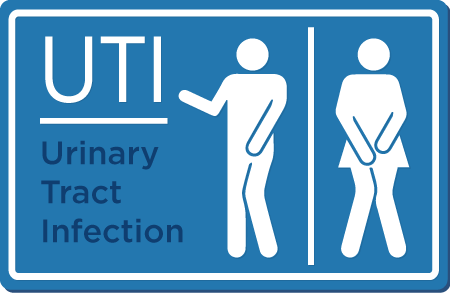Urinary Tract Infections In Truckers

While researching for a Dave Nemo Radio Show with Clair Marie on Highway to Health Road Dog Channel, Sirius XM Radio Channel 146 (my favorite station) on Urinary Tract infections (UTIs), I came across some interesting facts.
Sometimes called the “Salesman’s Disease”, UTIs can result from long hours sitting behind the wheel and not stopping to urinate when necessary. Sound familiar? According to the Centers for Disease Control and Prevention (CDC), Urinary Tract Infections (UTI) are the most common infection in people and that Antibiotics are usually helpful. I said to myself, “what did we do before antibiotics?” Well, most of the “remedies” were not very pleasant and most did not work. These treatments included bleeding, douches, plaster, and anti-inflammatory plants and herbs. The latter treatment sounds like a possible effective treatment and may have led to the end point of this article. But let’s first look at the numbers, especially in truckers.
There are 3.6 million truckers according to the Federal Government. I think it is somewhere north of that number; more like 5 million (+ or – 1 million). According to an article in Truckers.com, The Bureau of Labor Statistics tells us that the most recent count has women constituting just 5.1 percent of truck drivers. While both get UTI’s there are sometimes different mechanisms involved possibly requiring different approaches to treatment. What is the difference in male and female drivers when it comes to UTIs? The biggest difference is the presence of a prostate gland in men and, plainly speaking, the anatomy with women. When it comes to UTIs, these are very important factors on my side of the fence as a doctor.
Statistically, more infections occur in the women than men. Why? Well, the vagina can be a challenge to keep clean and dry. Since the urethra is located at the top of the vaginal folds it has a buffer strip that gives the urethra some protection. However, children and older women sometimes leak or do not wipe in the proper direction after urination (front to back). The rectum and vagina are located in very close proximity to one another. Bacteria can move back and forth more easily than in men. This can cause more bouts of urethritis. This is the lower unitary tract infection/inflammation which burns when urinating. This infection can be followed by cystitis, causing painful urination and urinary tract inflammation and urination urgency. If left untreated UTIs can lead to the “big infection” which is nephritis or inflammation/infection of the Kidney.
While women get most of the grief when it comes to UTIs, men get there share when it comes to prostate problems. National Institutes of Health (NIH) reports that 50% of men will experience prostatitis during their lifetime. Prostatitis is swelling and inflammation of the prostate gland, a walnut-sized gland situated directly below the bladder in men. One study reported that 22% of men under 40 years of age will have had a UTI and 60 % of those over 40 will be affected. Female UTIs, while uncomfortable, are much less serious than prostatitis in men. Prostatitis can develop into prostate gland enlargement is a common condition as men get older. Also called benign prostatic hyperplasia (BPH), prostate gland enlargement can cause bothersome urinary symptoms. Untreated, prostate gland enlargement can block the flow of urine out of the bladder and cause bladder, urinary tract or kidney problems.
This gland was why the dreaded digital exam was invented. Truckers hate getting a digital exam; it can hurt and can put a dent on one’s dignity. When it doesn’t hurt there is usually no disease found except a cancerous tumor which does not usually hurt. The digital exam can help with early diagnosis. So guys, suck it up and get your prostate check regularly. It may save your life!
Getting back to pre-antibiotic remedies, the first effective treatment from ancient times and even today as a preventative agent is water. You say what?? Yes water. What does water do for both men and women? Two liters a day dilutes the urine which means it flushes out the bacteria flora from the tip of the penis and female urethra. Is this better than Cranberries? Absolutely. Is it better that an antibiotic? Yes if started early or preventively on a daily basis. Cranberries are still not proven to an effective treatment for UTIs but may have some preventative affect. Cranberry juice and prevention is a theory that we don’t debate with patients about unless they are diabetic. Sugar!
Now to the topic of this paper. The article below is from the UK in the British Medical Journal published this year. It shows that ibuprophen given early for UTIs can decreased the overall number of antibiotic prescriptions issued. If in doubt about what to do, the Telemedicine Program here at Dr. John’s Medical Solutions can help get you the right answers for your UTI problems.
Here are several helpful tips that might help you avoid UTIs:
- When you have to pee, stop and pee. Don’t hold it until the last possible moment
- Keep your “nether regions” clean and dry.
- Drink plenty of liquids, especially water. Drink lots of water. Lots and lots and lots.
- Drink cranberry juice.
- Women, wipe from front to back (TMI, I know but be warned).
- Empty your bladder soon after intercourse.
- Avoid potentially irritating feminine products.
- Change your birth control method.
One helpful tip for accurate urine testing is to always obtain a “clean catch” urine sample or “mid-stream” sample if your symptoms do not improve and testing of your urine becomes necessary. Be sure to refrigerate until the sample can be submitted for testing. Another tip, when you have to pee…pee!
https://www.trucks.com/2016/09/28/female-truckers-face-industry-hurdles/
https://wwwnc.cdc.gov/eid/article/3/1/97-0113_article
Ibuprofen Versus Fosfomycin for Uncomplicated Urinary Tract Infection in Women: Randomized Controlled Trial BMJ 2015;351 (December 23) h6544
